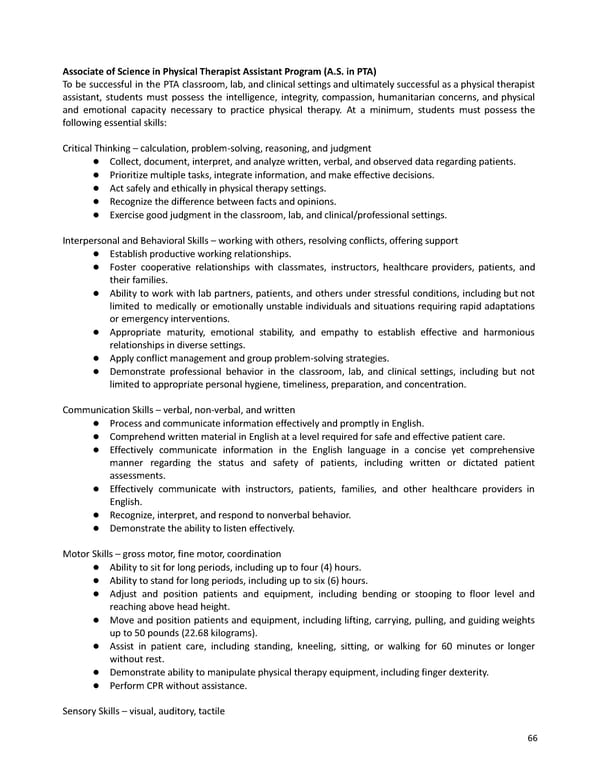Associate of Science in Physical Therapist Assistant Program (A.S. in PTA) To be successful in the PTA classroom, lab, and clinical settings and ultimately successful as a physical therapist assistant, students must possess the intelligence, integrity, compassion, humanitarian concerns, and physical and emotional capacity necessary to practice physical therapy. At a minimum, students must possess the following essential skills: Critical Thinking – calculation, problem-solving, reasoning, and judgment ● Collect,document,interpret,andanalyzewritten,verbal,andobserveddataregardingpatients. ● Prioritize multiple tasks, integrate information, and make effective decisions. ● Actsafelyandethicallyinphysicaltherapysettings. ● Recognizethedifferencebetweenfactsandopinions. ● Exercisegoodjudgmentintheclassroom,lab,andclinical/professionalsettings. Interpersonal and Behavioral Skills – working with others, resolving conflicts, offering support ● Establishproductiveworkingrelationships. ● Foster cooperative relationships with classmates, instructors, healthcare providers, patients, and their families. ● Ability to work with lab partners, patients, and others under stressful conditions, including but not limited to medically or emotionally unstable individuals and situations requiring rapid adaptations or emergencyinterventions. ● Appropriate maturity, emotional stability, and empathy to establish effective and harmonious relationships in diverse settings. ● Applyconflictmanagementandgroupproblem-solvingstrategies. ● Demonstrate professional behavior in the classroom, lab, and clinical settings, including but not limited to appropriate personal hygiene, timeliness, preparation, and concentration. CommunicationSkills–verbal,non-verbal,andwritten ● ProcessandcommunicateinformationeffectivelyandpromptlyinEnglish. ● ComprehendwrittenmaterialinEnglishatalevelrequiredforsafeandeffectivepatientcare. ● Effectively communicate information in the English language in a concise yet comprehensive manner regarding the status and safety of patients, including written or dictated patient assessments. ● Effectively communicate with instructors, patients, families, and other healthcare providers in English. ● Recognize,interpret,andrespondtononverbalbehavior. ● Demonstratetheabilitytolisteneffectively. MotorSkills – gross motor, fine motor, coordination ● Abilitytositforlongperiods,includinguptofour(4)hours. ● Abilitytostandforlongperiods,includinguptosix(6)hours. ● Adjust and position patients and equipment, including bending or stooping to floor level and reaching above head height. ● Moveandposition patients and equipment, including lifting, carrying, pulling, and guiding weights upto50pounds(22.68kilograms). ● Assist in patient care, including standing, kneeling, sitting, or walking for 60 minutes or longer withoutrest. ● Demonstrateabilitytomanipulatephysicaltherapyequipment,includingfingerdexterity. ● PerformCPRwithoutassistance. SensorySkills – visual, auditory, tactile 66
 2023-2024 | Catalog Page 65 Page 67
2023-2024 | Catalog Page 65 Page 67